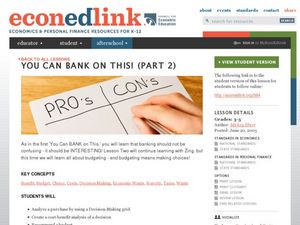Council for Economic Education
Satisfaction Please! (Part 3)
Understanding the US government's role proves very important in the American economy, especially for consumers. Scholars learn about how varying government agencies help them when facing an issue. The third and final resource in the...
Council for Economic Education
Satisfaction Please! (Part 2)
Simply understanding consumer rights may not help people solve their problems. Understanding who to turn to becomes key in many different scenarios. Teach the value of various organizations that fight for consumer rights through...
Council for Economic Education
Satisfaction Please! (Part 1)
The topic of consumerism seems easy to those who participate actively in the US economy, but pupils who are new to economics may see the idea as foreign. Help them understand their rights as consumers and what to expect when interacting...
Council for Economic Education
You Can BANK on This! (Part 2)
This is part two in a four-part instructional activity on banking and personal finance. For this instructional activity, learners analyze whether or not they have made a good purchase, then discuss how to make an informed decision about...
Council for Economic Education
What Do People Want to Wear?
Who doesn't love fashion, especially when it can be applied to economics, supply, demand, market trends, and price equilibrium. Curious young consumers examine market scenarios to determine their effect on the demand and price for...
Council for Economic Education
New Sense, Inc. vs. Fish 'Till U Drop or Coase Vs. Pigou
Who is responsible for protecting the environment, and who should pay when it is damaged? The role of government and private industry is complicated. A role-play simulation prompts individuals to decide how to protect a fictitious town...
Council for Economic Education
Mercantilists and the Midas Touch
What is the connection between greed and mercantilism? Historians consider this question by analyzing a fairy-tale like story about King Midas from the nineteenth century. The background information and excerpt help pupils understand the...
Council for Economic Education
The Columbian Exchange
What did you have for dinner last night? Many scholars ask that question without considering the history behind the foods they eat. Using a simulation, scholars investigate how the foods they eat are the product of the Columbian...
Council for Economic Education
What's the Big Deal about Spices?
Today's gourmands don't consider spices to be the equivalent of silver and gold. During the middle ages, however, these commodities were precious. People back then used spices in religious ceremonies, to cure rotten food, and as a show...
Council for Economic Education
The Economic System of Medieval Europe
How are economics and politics intertwined? Societies in the Medieval period used feudalism for both economic and military reasons. The arrangement provided safety and met other needs. Using the included simulation, individuals...
Council for Economic Education
Economic Systems of the Incas and Aztecs
The Inca and Aztecs created vast economic empires in South America, but how did economics play a role? A simulation activity and reading help scholars evaluate the kinds of markets these great civilizations created. They then consider...
Council for Economic Education
Fall of Rome
What led to the fall of Rome? Scholars have debated the question since the end of the great empire. Young historians consider the same question through an economic lens using an engaging lesson that involves a hands-on evaluation of the...
Council for Economic Education
The Silk Road
The Silk Road connected the European, Middle Eastern, and Asian worlds. It also helped create the modern trade world. An analysis activity makes the importance of this Chinese innovation clear by asking participants to evaluate trades...
Council for Economic Education
The Neolithic Agricultural Revolution
What effect could one person's invention have on the human race? In the case of the Neolithic Agricultural Revolution, small improvements in farming methods led to increased food production. The human population began to boom, leading us...
Council for Economic Education
How Neolithic Farmers Increased Their Standard of Living
How do people improve their economic situations? While many learners may not consider questions about how many crops to grow in ancient times were economic decisions, a hands-on activity encourages individuals to make these connections....
Council for Economic Education
Out of Africa: Why Early Humans Settled around the World
Why would someone want to leave home? The age-old question is at the center of a thought-provoking activity. Scholars consider why humans move around the world both during pre-historical times and today using a PowerPoint, reading on...
Council for Economic Education
What Makes an Entrepreneur?
What do the founders of Wendy's and Virgin Airlines have in common? They are both entrepreneurs! Key definitions and case studies help learners brainstorm their own definitions of what it takes to succeed in business. A series of...
Council for Economic Education
Production Possibilities Curve
Demonstrate the important economic principles of the production possibilities curve, including how to calculate opportunity cost and graph curves by using a table or calculation. Learners use a variety of methods, including videos,...
Council for Economic Education
China - Where Will They Fit in the World Economy?
Teach scholars why China is so crucial to global economics through an informative resource. Activities include using databases to search for information, watching a video or listening to a podcast, and reading about China's economy as a...
Council for Economic Education
Christopher Columbus, Entrepreneur? Queen Isabella, Venture Capitalist?
What did it take to embark on a journey to unknown lands? Perhaps ambition, but also money! Christopher Columbus had to approach more than one European monarch for financing before he could sail the ocean blue. A read-along play and...
Council for Economic Education
Why Didn't China Discover the New World?
Who was Zheng He and why haven't we heard of him? Scholars consider the question as they compare his vast expeditionary force to that of Christopher Columbus. Young historians then ponder the intersection of science, economics, and...
Council for Economic Education
Business in the Middle Ages: Working in a Guild
Long before modern labor unions, guilds worked to ensure that workers had a fair wage. But, in medieval Europe, they also cooperated with the government. Using a simulation and primary source analysis, young scholars become hatters in...
Council for Economic Education
Wages and the Black Death
While the Black Death wiped out a third of Europe's population during the Middle Ages, its destruction paved the way for better wages for workers and even an early form of modern capitalism. The relationship between the cataclysmic...
Council for Economic Education
Athens and Sparta-Imagine the Possibilities
Both Athens and Sparta made choices to survive in ancient Greece. Those choices were, in essence, economic ones about how to direct resources. A Venn diagram activity and reading ask class members to examine the connection between...

























